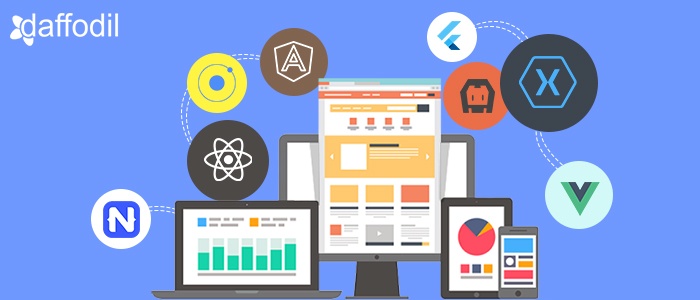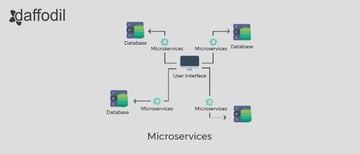
From static websites to dynamic SPAs, frontend of applications has come a long way. Likewise, developers no more have to write long lines of code repeatedly to create mobile apps for multiple platforms. And in this progression of frontend development, tools, libraries, and frameworks have been the game changer.
Here is a list of such sort-after tools and frameworks that have been making a difference to the development cycle by saving cost, time, and ensuring scalability. This list of frontend development tools is the best of 2018 that can promise effortless web and mobile app development.
For Web Development:
1. ReactJS
ReactJS is a javascript library to build user interfaces for websites and web apps. It’s a component based JS library, wherein components combine to compose a complex application UI. Virtual DOM, reusable components, declarative programming are some of the reasons to choose ReactJS for frontend development.
2. AngularJS
AngularJS by Google is a structural framework for building dynamic web pages. It’s a javascript framework that enable developers to use HTML as template language and extend HTML syntax with new attributes to create Single Page Applications (SPA).
3. VueJS
VueJS is the brainchild of Evan You, an ex-Google employee. The frontend development framework for web is known and appreciated for fast virtual DOM, reusable components, and all that with a basic technical know-how of HTML, CSS, and JS.
4. MeteorJS
MeteorJS is an open-source platform for building web, mobile, and desktop apps. It is integrated with JavaScript stack that extends from the database to the end user's screen. Meteor integrates with React, VueJS, Angular, MongoDB, NPM, and Cordova to given an edge to development.
5. EmberJS
EmberJS, originally called the SproutCore MVC Framework is based on MVC design pattern. The framework has a huge repository of plugins, templating engine, Command-Line Interface (CLI) to support seamless web application development.
6. Npm
Npm is Node Package Manager for Javascript. It enable developers to discover packages o reusable codes and then use them in different applications, as required. Npm is one of the sort-after front end development tools, using which, developers can adapt packages of code for apps, or incorporate packages as they are.
For Mobile Development:
Cross Platform Native Frameworks:
7. React Native
React Native is a javascript library for building cross platforms apps. With React Native, developers have the opportunity to create reusable components to speed up and scale app development. By using React and Javascript as core programming languages, native mobile apps can be developed, which is indistinguishable from an app built using Objective-C or Java.
8. Nativescript
Nativescript is an open-source framework for building cross-platform apps with native look & feel. By using Angular, Vuejs, Typescript, and Javascript as core languages, mobile apps for Android and iOS can be built with code reusability benefits.
ALSO READ: Nativescript VS React Native: Overview and Comparison
9. Flutter
Flutter is an open-source mobile application development framework, created by Google. It is used to develop applications for Android and iOS using Dart as the core programming language. Native UI, performance, and faster development with hot reloading are some of the benefits tagged with Flutter.
10. Xamarin
Xamarin by Microsoft has a set of tools for Android, iOS, and Windows development. Using C# as core language for development, native mobile apps are can be built with single shared .NET code base. Apps built using Xamarin leverage platform-specific hardware acceleration, and are compiled for native performance. This can’t be achieved with solutions that interpret code at runtime.
11. Appcelerator Titanium
Titanium SDK is an open-source framework that allows the creation of native mobile apps on platforms including iOS, Android and Windows UWP from a single JavaScript codebase. It includes cross-platform APIs for accessing native UI components, such as menus, dialog box, navigation bars, and device functionality like network geolocation, maps, network, and file system.
HTML5 Frameworks:
12. Ionic
Ionic is HTML5 framework that uses HTML, CSS, and Javascript for building hybrid apps. The framework uses Cordova, plugins for having access to the features of host OS, such as Camera, GPS, Flashlight etc. The apps built using Ionic can be customized for Android, iOS, Windows, or modern browsers.
13. OnSen UI
OnSen UI is a JS framework for building hybrid mobile apps using HTML, CSS, and Javascript. Onsen UI is compatible with both AngularJS and Angular 2+, React, Vue, and jQuery so that developers can switch between different libraries and frameworks for building interactive UIs.
14. Apache Cordova
Apache Cordova is an open-source, HTML framework for building mobile apps. Its enables wrapping up of HTML, CSS, and Javascript code, according to the device or platform. Reusable code across platforms, access to native device APIs, support or offline scenarios, integration with other frameworks are some of the reasons to trust Cordova for mobile app development.
15. Framework7
Framework7 gives the opportunity to create hybrid mobile apps, using web technologies- HTML, CSS, and JS. The framework comes built-in UI elements and widgets like list views, side panels, pop up, modals, popover, form elements etc. to accelerate app development cycle.




